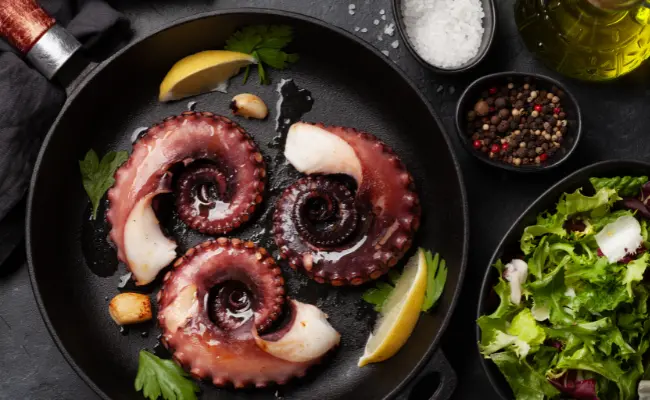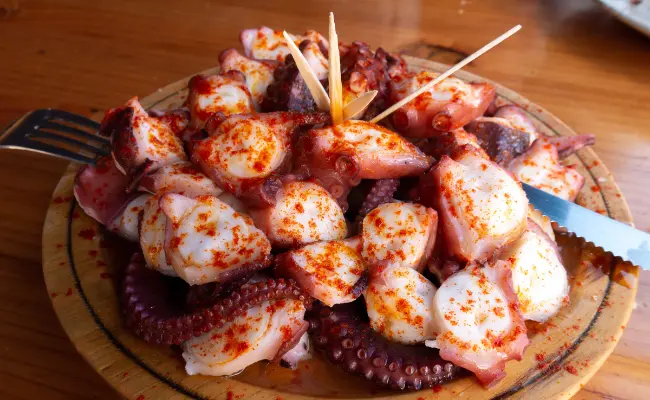
When it comes to our furry companions, they are often curious about the food we eat. However, not everything from our plates is safe for them. If you’ve ever found yourself with octopus in your kitchen, you might be wondering whether it’s a safe and healthy treat for your dog. The answer lies in the preparation and portion size. While octopus can be a nutritious option for dogs, it’s essential to understand the do’s and don’ts. In this article, we’ll explore the world of canine cuisine and guide you through the ins and outs of feeding octopus to your beloved pet.
Can Dogs Eat Octopus?
Certainly! Dogs can safely enjoy octopus, but it should be cooked and served plain, in moderate portions. This not only ensures their safety but also offers a healthy option for your furry companion. Octopus is rich in protein, vitamins A, B3, B9, B12, omega-3, and omega-6 fatty acids, all of which support nerve function, blood health, and are vital for your dog’s heart health.

As octopus isn’t a common household ingredient, it’s a good practice to share it with your dog whenever you have it available. It’s important to avoid serving raw octopus or any other raw seafood or meat, as these can be hard on your dog’s digestion. Additionally, dried or canned octopus might contain preservatives that aren’t ideal for your pet’s health. To keep things simple and easy on your dog’s stomach, serve octopus without any added spices, seasonings, or cooking oils. As with introducing any new food, it’s wise to observe your dog’s reaction the first time they try octopus.
Read More: Can Dogs Have Provolone Cheese?
Balancing Octopus Treats: The 90/10 Rule for Your Dog’s Diet
When it comes to feeding your dog octopus, it’s essential to adhere to the 90/10 rule. Treat octopus as an occasional indulgence, ensuring that treats, including octopus, account for no more than 10% of your dog’s daily diet. To determine the appropriate amount of octopus, you’ll need to keep a close eye on your dog’s daily food intake. By doing so, you can strike a balance between giving them a delightful treat and maintaining a well-rounded diet.
Read More: Can Dogs Eat Oatmeal Cream Pies?
Health Benefits of Feeding Dogs Octopus
The nutritional value of octopus can significantly contribute to your dog’s overall health. Consider the following nutrients and potential health benefits when incorporating octopus into your dog’s diet:
- Fats: Octopus is rich in healthy fats, particularly omega-3 fatty acids. These fats play a vital role in promoting heart health, reducing cholesterol levels, and aiding in digestion. They also bolster your dog’s immune system and contribute to the maintenance of a shiny, healthy coat.
- Protein: Octopus serves as an excellent source of protein and essential amino acids, providing your dog with the energy needed for their daily activities and supporting the development of strong muscles. Additionally, protein plays a crucial role in expediting wound healing.
- Vitamins and Minerals: Octopus is packed with essential vitamins and minerals that enhance your dog’s well-being. Notably, vitamin B12 supports healthy digestion and the production of red blood cells. Octopus also contains iron, phosphorus, potassium, and copper, all of which contribute to muscle strength, bone density, optimal blood circulation, and sustained energy levels in your furry companion.
Read More: Can Dogs Have Provolone Cheese?
Potential Risks of Feeding Dogs Octopus
While octopus can offer benefits to your dog’s health, it’s essential to be aware of potential adverse effects and risks:
- Choking Hazard: Octopus meat can be tough and chewy, so it’s crucial to prepare it properly and serve it in small, manageable bites. Additionally, be cautious of the tentacles, as raw octopus tentacles may still exhibit movement, posing a choking hazard to dogs. It’s advisable to avoid feeding your pet raw octopus meat.
- Heavy Metal Contamination: Like many other types of seafood, octopus can contain trace amounts of heavy metals such as lead and mercury. Excessive consumption of these heavy metals can lead to short-term symptoms like fatigue, vomiting, and diarrhea. In the long term, heavy metal exposure can harm the nervous system and result in severe health issues, including blindness.
- Pathogenic Bacteria: Raw octopus may carry pathogenic bacteria that have the potential to cause digestive issues like vomiting, diarrhea, and infections in dogs. To mitigate this risk, ensure that octopus is properly cooked before serving it to your pet.
- Sodium Poisoning: Octopuses are saltwater creatures, and their meat can contain elevated sodium levels. Excessive salt consumption in dogs can lead to symptoms like diarrhea, vomiting, and even seizures, making sodium poisoning a potentially fatal condition for dogs. It’s crucial to monitor and limit your dog’s sodium intake to keep them safe and healthy.
Read More: Can Dogs Eat Egg Rolls? Safety, Benefits, and Risks
Must Read Before Sharing Octopus With Your Pooch
It’s crucial to remember that some human foods may lead to unfavorable reactions in your canine companion. Hence, it’s wise to consult your veterinarian to assess the safety of incorporating these foods into your pet’s diet. This article is intended for educational and informational purposes only and should not be considered a replacement for professional medical or dietary guidance. Your veterinarian is the best source of advice when it comes to your pet’s specific dietary needs and overall well-being.
Read More: Can Dogs Eat Tamales? Understanding the Potential Risks and Benefits
FAQs.
Can Dogs Eat Raw Octopus?
Feeding your dog raw octopus is not recommended. Raw octopus can be tough to digest and may contain bacteria that can be harmful to your dog’s health. It’s safer to serve octopus cooked and unseasoned in small, manageable portions. Always consult with your veterinarian before introducing new foods to your dog’s diet to ensure their safety and well-being.
Can Dogs Eat Octopus Cooked?
Yes, dogs can eat cooked octopus in moderation. It’s important to ensure that the octopus is cooked thoroughly and served without any seasonings, spices, or additives. Feeding your dog plain, cooked octopus can be a safe and healthy treat, but it should be given in small portions to avoid digestive issues. Always monitor your dog’s reaction when introducing new foods into their diet and consult with your veterinarian if you have any concerns.
Related Post:
- Can Dogs Eat Babybel Cheese?
- Can Dogs Eat Plantain Chips Safely? Understanding the Risks and Benefits
- Can Dogs Eat French Toast? Risks and Guidelines
- Can Dogs Eat Veggie Straws? Unveiling the Canine Snacking Dilemma
- Can Dogs Eat Rotisserie Chicken? Unveiling the Truth
- Can Dogs Eat Orange Chicken? Exploring the Safety and Risks
- Can Dogs Eat Durian Safely?
- Can Dogs Eat Cheerios? Safe or Risky Snacking?
- Can Dogs Eat Couscous?
- Can Dogs Eat Banana Peppers?
- Can Dogs Eat Funyuns?
- Can Dogs Eat Acai? Exploring the Safety and Benefits
- Can Dogs Eat Tuna?
- Can Your Dog Eat Onions? Here’s Why You Should Avoid It



